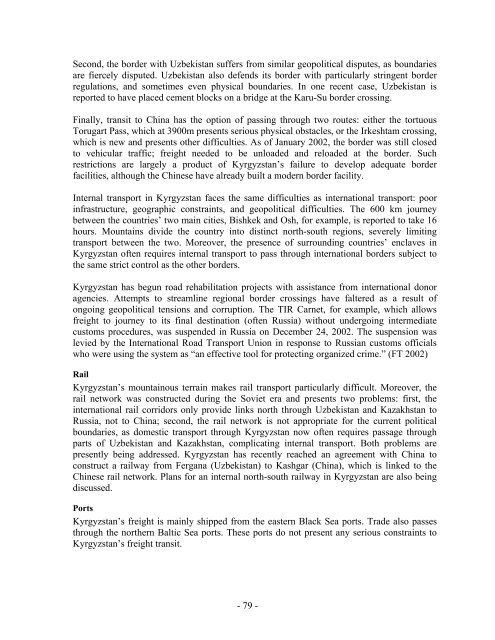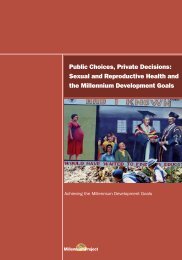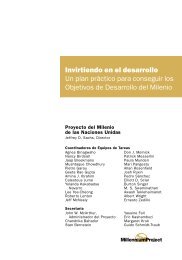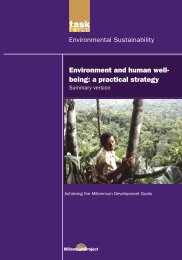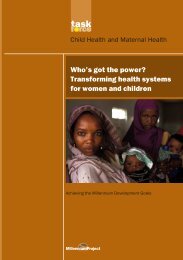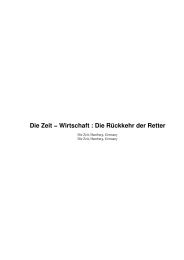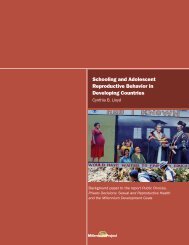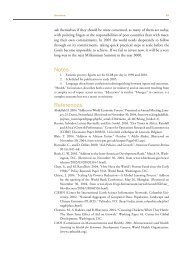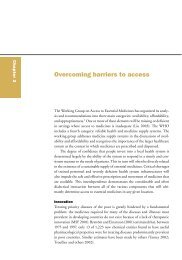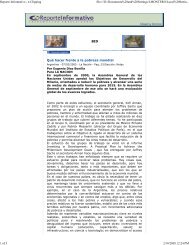the challenges facing landlocked developing countries: a case study ...
the challenges facing landlocked developing countries: a case study ...
the challenges facing landlocked developing countries: a case study ...
Create successful ePaper yourself
Turn your PDF publications into a flip-book with our unique Google optimized e-Paper software.
Second, <strong>the</strong> border with Uzbekistan suffers from similar geopolitical disputes, as boundaries<br />
are fiercely disputed. Uzbekistan also defends its border with particularly stringent border<br />
regulations, and sometimes even physical boundaries. In one recent <strong>case</strong>, Uzbekistan is<br />
reported to have placed cement blocks on a bridge at <strong>the</strong> Karu-Su border crossing.<br />
Finally, transit to China has <strong>the</strong> option of passing through two routes: ei<strong>the</strong>r <strong>the</strong> tortuous<br />
Torugart Pass, which at 3900m presents serious physical obstacles, or <strong>the</strong> Irkeshtam crossing,<br />
which is new and presents o<strong>the</strong>r difficulties. As of January 2002, <strong>the</strong> border was still closed<br />
to vehicular traffic; freight needed to be unloaded and reloaded at <strong>the</strong> border. Such<br />
restrictions are largely a product of Kyrgyzstan’s failure to develop adequate border<br />
facilities, although <strong>the</strong> Chinese have already built a modern border facility.<br />
Internal transport in Kyrgyzstan faces <strong>the</strong> same difficulties as international transport: poor<br />
infrastructure, geographic constraints, and geopolitical difficulties. The 600 km journey<br />
between <strong>the</strong> <strong>countries</strong>’ two main cities, Bishkek and Osh, for example, is reported to take 16<br />
hours. Mountains divide <strong>the</strong> country into distinct north-south regions, severely limiting<br />
transport between <strong>the</strong> two. Moreover, <strong>the</strong> presence of surrounding <strong>countries</strong>’ enclaves in<br />
Kyrgyzstan often requires internal transport to pass through international borders subject to<br />
<strong>the</strong> same strict control as <strong>the</strong> o<strong>the</strong>r borders.<br />
Kyrgyzstan has begun road rehabilitation projects with assistance from international donor<br />
agencies. Attempts to streamline regional border crossings have faltered as a result of<br />
ongoing geopolitical tensions and corruption. The TIR Carnet, for example, which allows<br />
freight to journey to its final destination (often Russia) without undergoing intermediate<br />
customs procedures, was suspended in Russia on December 24, 2002. The suspension was<br />
levied by <strong>the</strong> International Road Transport Union in response to Russian customs officials<br />
who were using <strong>the</strong> system as “an effective tool for protecting organized crime.” (FT 2002)<br />
Rail<br />
Kyrgyzstan’s mountainous terrain makes rail transport particularly difficult. Moreover, <strong>the</strong><br />
rail network was constructed during <strong>the</strong> Soviet era and presents two problems: first, <strong>the</strong><br />
international rail corridors only provide links north through Uzbekistan and Kazakhstan to<br />
Russia, not to China; second, <strong>the</strong> rail network is not appropriate for <strong>the</strong> current political<br />
boundaries, as domestic transport through Kyrgyzstan now often requires passage through<br />
parts of Uzbekistan and Kazakhstan, complicating internal transport. Both problems are<br />
presently being addressed. Kyrgyzstan has recently reached an agreement with China to<br />
construct a railway from Fergana (Uzbekistan) to Kashgar (China), which is linked to <strong>the</strong><br />
Chinese rail network. Plans for an internal north-south railway in Kyrgyzstan are also being<br />
discussed.<br />
Ports<br />
Kyrgyzstan’s freight is mainly shipped from <strong>the</strong> eastern Black Sea ports. Trade also passes<br />
through <strong>the</strong> nor<strong>the</strong>rn Baltic Sea ports. These ports do not present any serious constraints to<br />
Kyrgyzstan’s freight transit.<br />
- 79 -


